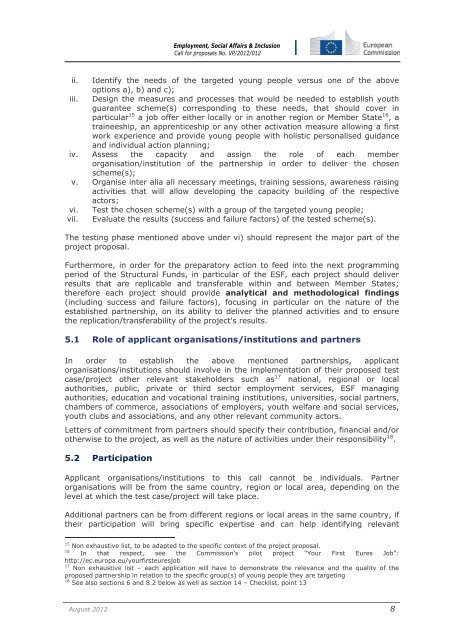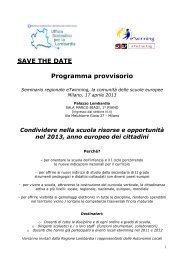VP/2012/012 - European Commission - Europa
VP/2012/012 - European Commission - Europa
VP/2012/012 - European Commission - Europa
Create successful ePaper yourself
Turn your PDF publications into a flip-book with our unique Google optimized e-Paper software.
Employment, Social Affairs & InclusionCall for proposals No. <strong>VP</strong>/<strong>2<strong>012</strong></strong>/<strong>012</strong>ii. Identify the needs of the targeted young people versus one of the aboveoptions a), b) and c);iii. Design the measures and processes that would be needed to establish youthguarantee scheme(s) corresponding to these needs, that should cover inparticular 15 a job offer either locally or in another region or Member State 16 , atraineeship, an apprenticeship or any other activation measure allowing a firstwork experience and provide young people with holistic personalised guidanceand individual action planning;iv. Assess the capacity and assign the role of each memberorganisation/institution of the partnership in order to deliver the chosenscheme(s);v. Organise inter alia all necessary meetings, training sessions, awareness raisingactivities that will allow developing the capacity building of the respectiveactors;vi. Test the chosen scheme(s) with a group of the targeted young people;vii. Evaluate the results (success and failure factors) of the tested scheme(s).The testing phase mentioned above under vi) should represent the major part of theproject proposal.Furthermore, in order for the preparatory action to feed into the next programmingperiod of the Structural Funds, in particular of the ESF, each project should deliverresults that are replicable and transferable within and between Member States;therefore each project should provide analytical and methodological findings(including success and failure factors), focusing in particular on the nature of theestablished partnership, on its ability to deliver the planned activities and to ensurethe replication/transferability of the project's results.5.1 Role of applicant organisations/institutions and partnersIn order to establish the above mentioned partnerships, applicantorganisations/institutions should involve in the implementation of their proposed testcase/project other relevant stakeholders such as 17 national, regional or localauthorities, public, private or third sector employment services, ESF managingauthorities, education and vocational training institutions, universities, social partners,chambers of commerce, associations of employers, youth welfare and social services,youth clubs and associations, and any other relevant community actors.Letters of commitment from partners should specify their contribution, financial and/orotherwise to the project, as well as the nature of activities under their responsibility 18 .5.2 ParticipationApplicant organisations/institutions to this call cannot be individuals. Partnerorganisations will be from the same country, region or local area, depending on thelevel at which the test case/project will take place.Additional partners can be from different regions or local areas in the same country, iftheir participation will bring specific expertise and can help identifying relevant15 Non exhaustive list, to be adapted to the specific context of the project proposal.16In that respect, see the <strong>Commission</strong>’s pilot project “Your First Eures Job”:http://ec.europa.eu/yourfirsteuresjob17 Non exhaustive list – each application will have to demonstrate the relevance and the quality of theproposed partnership in relation to the specific group(s) of young people they are targeting18 See also sections 6 and 8.2 below as well as section 14 – Checklist, point 13August <strong>2<strong>012</strong></strong> 8









